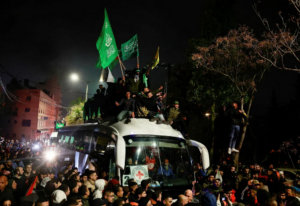Fireworks, flowers and Sinwar: Hamas wins big in West Bank as Palestinian prisoners are released

Celebrations for the released prisoners in Beitunia, in the West Bank, overnight into 20 January 2025
Hagar Shezaf reports in Haaretz on 20 January 2025:
On Sunday, thousands of people thronged the streets of Ramallah, and many of them were waiting outside since the early afternoon. Some lit bonfires near the Beitunia crossing, others climbed the hill that overlooks Ofer Prison and waved Palestinian flags.
At 1:00 A.M., after a seven-hour delay, the buses carrying the Palestinian prisoners dressed in gray prison uniforms were seen crossing through the checkpoint. Young men with a green Hamas flag climbed on the roof of one of the buses, which had the Red Cross symbol on it. Even after the long wait, the excitement was clearly visible on people’s faces.
The Palestinian prisoners were supposed to be released in the early evening, shortly after the three Israeli hostages reached Israeli territory. Israeli defense officials blamed the delay on the Red Cross. The Palestinians said the delay was caused by a problem with the counting of the female prisoners prior to their release. But the Israeli interest in postponing the release until late at night was clear.
Defense officials had stated from the start that they would seek to prevent large shows of celebration when the prisoners were released to the West Bank, and the army also said that brigade commanders would be tasked with barring big celebrations in their sectors.
But when the moment arrived, there were fireworks and chants of “The people want the Al-Qassam Brigades” (Hamas’ military wing), amid other shouts of “sword versus sword” by people who proclaimed, “We are the people of Mohammed Deif.” Several banners with the face of Yahya Sinwar could also be seen.
The crush of people grew as the buses approached Beitunia Square, and when the prisoners got off, they were swarmed by the crowd. Waiting anxiously at the side of the square was the husband of 62-year-old Khaleda Jarrar, a former member of the Palestinian parliament and the eldest of the female prisoners to be released in this first round.
When she got off the bus, she looked exhausted and a lot older than before. “There are mixed feelings,” she said. “On the one hand, there is joy over our freedom, and we thank everyone for that, but on the other hand, there is pain at the loss of so many martyrs who were killed in Gaza during the war.”
Jarrar was placed in administrative detention in December 2023 for “supporting terror,” and since August had been held in isolation at the Neve Tirza Prison. It was her fifth arrest, but she has only been convicted once, for membership in an illegal association. “There’s a duality to the emotion right now. Prison conditions were very hard, and we hope that all the prisoners will be released,” she said.
Many of the female prisoners who were just released are quite young, and one of them is still a minor. As soon as they got off the bus, they were crowned with wreaths of flowers. Children embraced their mothers, and parents whose young daughters were released stood beside them, looking both sorrowful and proud at once.
All of the women who were released spoke of having mixed emotions. “We’re coming out at the cost of the blood of the martyrs,” said 24-year-old Hanan M’aluani. She also wished to thank Gazans for “this great achievement.”
“Our happiness is incomplete because of the Gazans and because we left behind three female prisoners from Gaza,” she said. She also said that the prison conditions were harsh and that the women prisoners were harassed by their guards.
Janin Amru, 23, who was held in administrative detention at Damon Prison in the Carmel area, was released after more than a year. “This is the first time I’m seeing the moon not from behind bars,” she said. “It’s a very strange feeling. I want to get back to my life. I have another year to go at the university.”
She said that Israeli security forces sometimes raided the female prisoners’ cells, and this often included beatings and teargas. Another prisoner said that before their release, they were instructed by the security personnel not to speak with the media. “They said that if we said anything, they’d put us back in jail.” She showed the media the marks on her wrists left by handcuffs.
Celebrations in Ramallah after the release of Palestinian prisoners as part of the cease-fire deal on Sunday.
PA security personnel were also spread out among the crowd. The Israeli army had blocked the exits from Ramallah, and huge traffic jams formed. Some young men burned tires on the road and asked reporters if they supported Fatah or Hamas. One wondered who would arrest him if he were filmed – Israeli forces or PA forces.
Three women and a young boy sat by the side of the road for three hours, waiting for the prisoners to arrive. They said they had come to celebrate the “victory of the resistance” in Gaza. “Is there anything more beautiful than this?” asked one, looking at all the celebrations. “Our father was imprisoned 18 times, and our sisters have gone to jail too,” they said, explaining why they felt the need to stand here now and wait to welcome prisoners they don’t personally know.
This article is reproduced in its entirety
